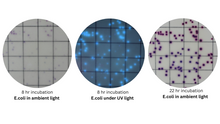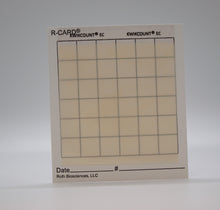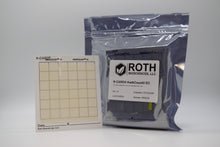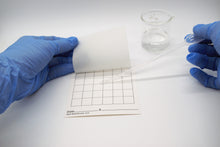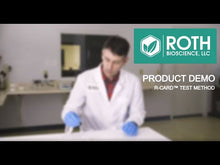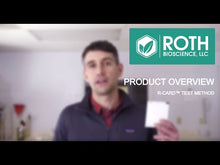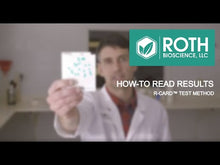
Card Size: 3.5"x 4" Capacity: 1mL STORAGE CONDITIONS AND STORAGE LIFE
A revolution in bacteria testing, the R-CARD® test method offers the most convenient, streamlined way to detect not only the presence of E. coli but also the number of colonies.
- Within 7-9 hours E.coli will fluoresce under long-wave UV light
- Beginning about 14-16 hrs incubation, the E.coli colonies will not only fluoresce in UV light but will also appear as blue/purple colonies in ambient light
- Completely self-contained, requiring almost no additional equipment
- Extremely accurate and easy-to-understand results

How It Works
The R-CARD® KwikCount® EC is made to contain the same formulation of nutrients as are in the 10 mL bottle of liquid that is included in the KwikCount MF EC Method. There are at least two ways to utilize the R-CARD® KwikCount® EC that give the same results as the EPA-approved method. First, the sample can be filtered with the same micropore filter, and the filter containing the bacteria is then placed in the center of the R-CARD® bottom (top lifted) and 1mL of sterile buffered or deionized water is deposited on the top of the membrane. The R-CARD® top piece is then lowered onto the wet filter, which is incubated for 7-9 hrs (41±0.5°C) as is the approved dish, removed, and subjected to long wave UV light in a darkroom. Any E. coli will fluoresce and be easily counted, just as in the KwikCount® MF EC EPA-approved method.
Easier yet, the aqueous sample can be diluted in sterile water or sterile buffered water so that each mL contains an appropriate number of the target E. coli (recommended 20-100 CFU/mL). Then, using a sterile 1mL dropper, lift the top piece of the R-CARD®, deposit 1 mL of the diluted aqueous sample on the middle of the bottom piece, and drop the top piece down onto it. The water will spread into a large circle and gel within 1-3 minutes. Incubate and count as before. It should be noted that this last approach saves time and money spent on the membrane filter and filtering, as well as the Petri dish cost.
If you wish to use any of the above-described R-CARD® methods, you must not assume that they are included in the USEPA-approved Method for Ambient Water. If approval is mandatory for your use, you must discuss your proposed protocol change with your area officials to see if there may be any options agreeable (such as side by side study with the approved method, etc).
For more detailed instructions, please check out the PDFs below. Remember, we offer free technical support on any stage of the process and would be happy to instruct and advise you.
Testing 2mL-100mL Aqueous Samples on R-Card® Using Membrane Filter (PDF)
Technical Step-by-Step Instructions: View PDF document
R-CARD General Use Instructions: View PDF document
Additional Helpful and Important Information
Why R-CARD® Rapid Tests Are Better Than Competing Products
R-CARD® rapid tests offer a revolution in convenience without sacrificing accuracy. The cards are completely self-contained and don’t require petri dishes, agar, or other gear that’s fragile and prone to leak. Simply place your sample on the card and wait 1-3 minutes for the liquid sample to solidify between the two layers. This prevents it from dripping or leaking. Cards can easily be stored in a coat or backpack pocket.
Additional Equipment Needed
While the R-CARD® rapid tests are completely self-contained, you will need a sterile dropper or syringe to dispense your liquid sample onto the card. Once your sample is collected, it’s recommended to use an incubator to rapidly decrease the time it takes to view results (7 to 24 hours with an incubator).
Ideal Uses
- Food & Beverage
- Agriculture
- Environmental Monitoring
- Cosmetics & Personal Care Manufacturing
- Education
- Municipal & Environmental Water
- Pharmaceuticals
- Veterinary
- Ambient Waters
- Swimming pools & hot tubs
Why Choose Roth Biosciences?
Dr. Jonathan Roth is one of the most well-known names in microbiology and bacteria testing. He was the first to develop testing methods to use enzyme substrates for producing different colors to distinguish different types of bacteria. Roth Biosciences continues to offer some of the most revolutionary innovations in the industry.




